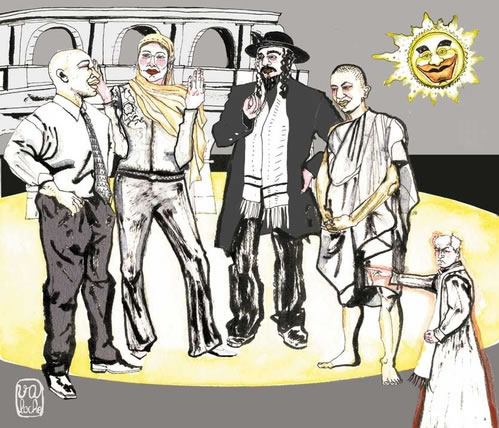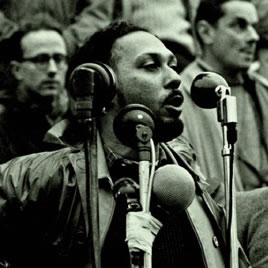Despite the ardent desire of many, religion just won't go away. The progressive secularisation of modern societies was supposed to push religion to the margins where it would wither away of its own accord. But if anything the religious voice seems to be growing louder, and increasingly permeating our politics. Prominent multiculturalists such as Bhikhu Parekh, author of Rethinking Multiculturalism, and Tariq Modood, author of Multicultural Politics, claim that religious affiliation is an important dimension of identity and should be protected as an aspect of an individual's civil and political rights. The state, and everyone else, they argue, should be compelled to respect religious belief.
 In response, the New Atheists such as Richard Dawkins, Christopher Hitchens, Sam Harris and AC Grayling have lambasted the irrationality of religious belief and its threat to Enlightenment values. And they take issue with the multiculturalist claim that religion deserves respect. But at the same time their own political prescriptions for dealing with this challenge are either naïve or inadequate. Atheists may be right in their insistence that god doesn't exist, and that it is illogical to believe in a supernatural creator, but this does not take care of the political issue of how a society composed of both the faithful and the faithless organises itself. If there is an argument for secularising the public realm it has to be different from the claim that religious claims are probably all false. Even if religion is harmful in the way that Dawkins or Harris claim, it is not the sort of harm that can be politically eradicated without imposing an intrusive and repugnant tyranny.
In response, the New Atheists such as Richard Dawkins, Christopher Hitchens, Sam Harris and AC Grayling have lambasted the irrationality of religious belief and its threat to Enlightenment values. And they take issue with the multiculturalist claim that religion deserves respect. But at the same time their own political prescriptions for dealing with this challenge are either naïve or inadequate. Atheists may be right in their insistence that god doesn't exist, and that it is illogical to believe in a supernatural creator, but this does not take care of the political issue of how a society composed of both the faithful and the faithless organises itself. If there is an argument for secularising the public realm it has to be different from the claim that religious claims are probably all false. Even if religion is harmful in the way that Dawkins or Harris claim, it is not the sort of harm that can be politically eradicated without imposing an intrusive and repugnant tyranny.
We therefore need to seek an alternative account of political secularism that distinguishes it from politically naïve atheism. Contemporary Liberal political theory is the best place to start.
Liberal secularism in its contemporary form is traceable to the ideas of the Harvard political philosopher John Rawls and the American legal philosopher Ronald Dworkin. For both thinkers a secular liberal order distributes and protects the rights of equal citizens. These rights ensure the equal status of citizens irrespective of their religious, political and cultural identities. Individuals are free to hold and practice whatever beliefs they wish as long as they are consistent with the equal rights of others. This has the important effect of privatising religion. Religious groups cannot claim special public protection or support as this would involve some people having to subsidise the life choices of others. But religious communities can thrive as private associations under the law.
For liberals the state must be neutral between individuals life choices. Consequently, it neither promotes, nor does it seek to suppress religion. Individuals remain free to say what they wish about others' beliefs and values. More controversially, Rawls argues that when deliberating about fundamental rights and liberties, legislators and judges must adopt the language of public reason. This means that no individual can have their rights denied or altered for reasons that they could reasonably reject and that legislation must forgo appeals to contentious religious, ethical and cultural beliefs.
One obvious consequence of this Liberal approach is that it builds an idea of individualism into its fundamental presuppositions. This individualism however will not be compatible with religious or ethical views that put the good of the group above any consideration of the interests of the individual.
The other important point about the Liberal resource-based conception of equality is that though it equalises external goods, it does not require that everybody respect the value of everyone else's life choices, beliefs or values. In this way it rejects the multiculturalist egalitarianism of Modood and Parekh, who insist that religious beliefs be accorded respect. Instead it demands equality of respect for the person not the belief. Critics of this view claim that Liberalism respects an abstract person, not a real person with gender, race, ethnicity or religious beliefs which they should not be expected to shuck off when they enter the public sphere. Yet this commitment to abstraction is no mere accident: it is central to the Liberal vision and it is there - and should remain there - for two crucial reasons.
First, the idea that an individual is identical with their ends, goals or beliefs is simply false. Personal coherence can withstand considerable changes of belief, culture and values. Such change might be costly to the person but it is not the case that anyone who loses her faith (religious or political) ceases to be the same person in anything but a metaphorical sense. Abstraction only requires that we see no set of commitments as being definitive of a person over time. Identity is not destiny, and it is the attempt to make it so that raises the political problem of religious and cultural authority in pluralistic societies.
The second reason for rejecting the idea that the person is defined by beliefs and values is that this would deny that people can adopt the perspective of a citizen. Citizen equality requires that people see themselves not only as belonging to a variety of identity-conferring groups but as doing so in a shared public space where not everyone will hold the same beliefs as they do. Equality (and civility) requires us to be able to step back sufficiently from our beliefs and values to live a common and minimally coercive life with others. This, not the existence or otherwise of a supernatural being, is the fundamental reason for the Liberal preference for secularism in the public realm. In a confessional state people who do not share the religious view of the majority will either be marginalised and denied the equal protection of the law or they will be required to falsely comply with beliefs and practices that they do not believe in. Such sullen submission is precisely the kind of false religiosity that the Enlightenment challenged and is something that most religions consider valueless.
Of course there will be religious zealots who argue they should never compromise with infidels and apostates. Let me stress that this is by no means a peculiarity of Muslims, as British history amply demonstrates. Yet militant defenders of religion who are not prepared to accept the burdens of civility cannot expect the protections of Liberal laws. Reciprocity is central to civility and Liberals have no obligation to protect those who act in an anti-Liberal fashion. They do have an obligation to protect those who hold anti-Liberal views but who pursue them peacefully. This view is overlooked by those New Atheists who wish to purge religion completely from the public domain. Liberals are not committed to the forcible maintenance of a belief in Liberal values and are prepared to rely on the force of argument alone to defend these values. But it can and should defend those values in ways that appeal both to atheists and to theists.
Liberal secularism is not a religious belief and has no non-political value. It is a view that applies to politics which is fundamentally characterised by ineradicable disagreement. It is of course possible that some religions might accept Liberal values only until demographic change gives them the monopoly of power. This is one of the dangers inherent in the system. But if a religious or political view does persist in claiming that it alone is not bound by the long-term obligations of Liberal civility, then it can hardly complain if it is criticised or vilified as a dangerous and backward doctrine. Such was the position of the Roman Catholic Church in Europe for much of the last four centuries, and it is a perception that it has struggled hard to overcome in the last 50 years. Moderate Islam is engaged in a similar struggle today.
Alongside those militant atheists who argue that Liberal secularism already concedes too much to religion, multiculturalists such as Parekh and Modood argue that the Liberal secularism I have defended assumes a caricature of religion as an uncompromising and static view of the world that has no place in plural societies. In place of this caricature they argue that the proper way to seek fair and equal terms of social cooperation is to negotiate ways around our differences in mutual respect.
The problem with this is that it demands too much of religions and fails to offer them true respect. We do not expect and would not desire uniformity and agreement in the realm of politics or personal morality. Disagreement, disapproval and denial form part of many religions, as well as non-religious ethical positions. If we are to respect religion then we need to respect it on its own terms, and that involves allowing it to speak for itself in its own way and to make its own exclusive truth claims. Such a strategy will indeed be controversial, challenging and sometimes offensive to others, but it is also part of the exchange of ideas that Liberals value above all else. To seek peaceful reconciliation of all beliefs, whereby no one is allowed to offend or disagree with anyone else, would be to afford a spurious recognition and respect that effectively silence religion altogether.
Of course, if religion is afforded this liberty to be itself and offend the sensibilities of others, then it must accept that others will be offended by it and criticise, mock and challenge its beliefs accordingly. This offence will no doubt be irksome but it remains offence and not harm as long as it is not translated into political and social marginalisation. As long as individuals do not violate the civil and political rights of others, they enjoy the protection of the Liberal state, whatever their beliefs.
Liberal secularism is an ideal only poorly realised in our current politics but it is a necessary ideal. It may well also be a godless doctrine in the sense that it does not appeal to theological premises, but it need not be a doctrine that attempts to eradicate religious belief; indeed, by not privileging any one religion in the public domain in a paradoxical way it protects religion by freeing it to speak in its own voice. Liberalism ensures we all have a right to do that.

